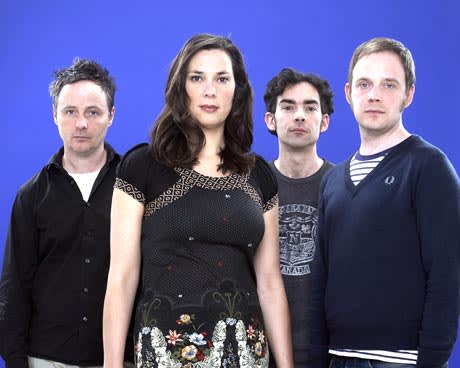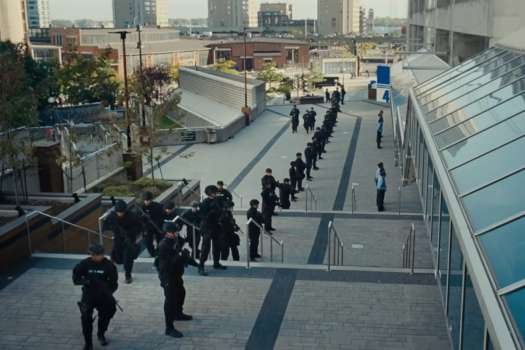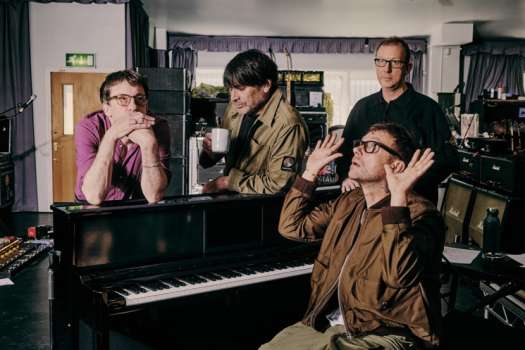Seventeen years and 11 albums in, whats left to say about Stereolab? Their signature sound is so distinctive that its hard to itemize their catalogue ideas flow across records, and each one is so varied. Still, Chemical Chords has an organic warmth that distinguishes it from other releases. While their records can be sprawling, this one is a collection of tight, complex pop songs Tim Gane has distilled the bands myriad influences into upbeat, even danceable numbers with structural roots in girl group and Motown tunes. The sound is less computerized and more human trumpets, saxophones and strings exist where Teutonic blips existed before. Laetitia Sadier sings with a bittersweet touch, leading Ganes songs in full chanteuse mode. Stereolabs renowned powers of reference have always been a blessing and a curse: on one hand, the band have a huge backlog of ideas and influences from which to pull great songs. On the other, fans sometimes abandon "the Lab once theyve discovered those influences for themselves. Chemical Chords is a lovely reminder that Stereolab are a band, not an encyclopaedia, a groundbreaking group whose ideas continue to thrive almost two decades in.
Its been four years since the last Stereolab studio record, and youve been working on other projects in the meantime. What brought you back together?
Sadier: I guess what keeps us together is whether or not Tim [Gane] has new ideas for us to present, to play with. So, this time we wanted to try out building towers, musical towers. We built many towers, 14 of which are on this album. [The rest] will be out in the shape of tour singles, things like that, as well as another album, which I hope will come out in about six months time. The continuation of this album theres a day side and then the night side is waiting to come out.
This album seems more emotionally charged than past releases.
I dont think [Tim] would admit to pouring emotions into his songs, although he clearly does theyre not completely cerebral songs. I think he works more in the realm of ideas and always has. But theres a lot of emotional intuition that is feeding the music, even cosmic relations [laughs] underlying it all; its not just brains. The ideas are a way to begin a record or a project, an excuse to begin. The beginning idea is like a little foetus. A little foetus is not an actual baby, its just a little thing, and the idea is just this little thing that will become what it becomes.
Stereolab are about as big as it can be without having "blown up. Are you still comfortable in your niche?
I think were quite happy, we have a very lovely audience; I find that a big part of [mainstream music] is very impoverishing, and I think that on the contrary, it should be enriching. That I deplore. But maybe [its a question] of being able to make a living out of what we do, and because people tend to not buy the records anymore, but download them for free, our income really, really suffers. I dont know if were going to carry on very much longer. There is a bit of a danger here. Well see.
(4AD)Its been four years since the last Stereolab studio record, and youve been working on other projects in the meantime. What brought you back together?
Sadier: I guess what keeps us together is whether or not Tim [Gane] has new ideas for us to present, to play with. So, this time we wanted to try out building towers, musical towers. We built many towers, 14 of which are on this album. [The rest] will be out in the shape of tour singles, things like that, as well as another album, which I hope will come out in about six months time. The continuation of this album theres a day side and then the night side is waiting to come out.
This album seems more emotionally charged than past releases.
I dont think [Tim] would admit to pouring emotions into his songs, although he clearly does theyre not completely cerebral songs. I think he works more in the realm of ideas and always has. But theres a lot of emotional intuition that is feeding the music, even cosmic relations [laughs] underlying it all; its not just brains. The ideas are a way to begin a record or a project, an excuse to begin. The beginning idea is like a little foetus. A little foetus is not an actual baby, its just a little thing, and the idea is just this little thing that will become what it becomes.
Stereolab are about as big as it can be without having "blown up. Are you still comfortable in your niche?
I think were quite happy, we have a very lovely audience; I find that a big part of [mainstream music] is very impoverishing, and I think that on the contrary, it should be enriching. That I deplore. But maybe [its a question] of being able to make a living out of what we do, and because people tend to not buy the records anymore, but download them for free, our income really, really suffers. I dont know if were going to carry on very much longer. There is a bit of a danger here. Well see.




